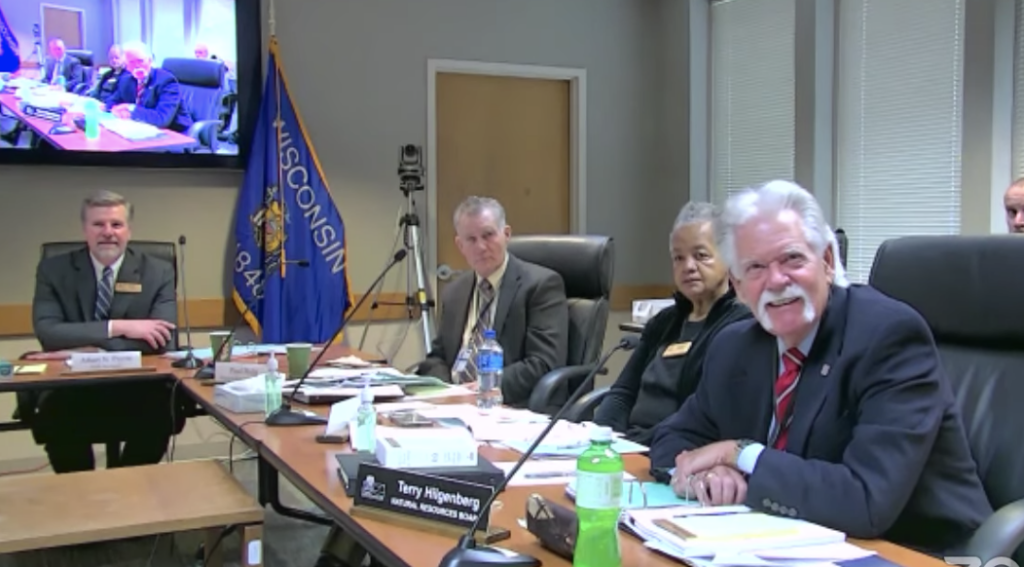DNR Avoids Drama With New Secretary, New Board
Wednesday's meeting was first without expired members who had refused to resign.

DNR Secretary-designee Adam Payne and members of the Natural Resources Board at the Jan. 25, 2023 meeting. (Screenshot | DNR)
In its first meeting in nearly two years without a member holding onto his seat long past its expiration, the Wisconsin Natural Resources Board approved new water quality standards and the 2023 bear harvest quota without the acrimony that has shaken the state’s conservation policy making since 2021.
The meeting Wednesday was the first in which new Department of Natural Resources Secretary-designee Adam Payne, as well as new board members Sandra Naas and Paul Buhr were on the body — giving appointees of Democratic Gov. Tony Evers a majority on the body for the first time early into the beginning of his second term in office.
Prehn, a Wausau dentist and business owner, had insisted his decision wasn’t political, yet his texts and emails showed he remained on the body to influence decisions over water quality and wolf population management with support from the Republican leadership of the state Senate and a number of other prominent Republicans across the state. The Republican grip on the board resulted in a lawsuit from Democratic Attorney General Josh Kaul seeking to boot Prehn from his seat. The Wisconsin Supreme Court decided last year that he could stay in the position so long as the Senate didn’t confirm his successor.
Prehn finally resigned from the board in December and his absence was noted only once during the meeting.
“I’d like to just send a big thank you out to the two board members that have vacated,” board chair Greg Kazmierski said. “People don’t really understand that this is not a paid position. This is a volunteer position here. And what you get out of it is bad press and angry people when we’re trying to seek that compromise. But Secretary or Dr. Prehn and Bill Bruins thank you for your service.”
Attending his first NRB meeting, Payne highlighted his focus on water issues as the state continues to find ways to prevent harmful contaminants such as PFAS and nitrates from leaching into the state’s water. Just a day after Evers had proposed spending $100 million on the issue in his State of the State address on Tuesday night, Payne declared it his top priority.
“I’d like to just briefly touch on a few issues of priorities and goals first, as the governor once again discussed last night water quality,” Payne said. “I’ve been asked quite a bit, well your first three weeks in the job, what are the most important pressing goals? You know, it’s going to take me a little longer than three weeks to get a handle on things. Obviously, water quality has always been important to me and I know it’s important to everyone in this room. And it’s so refreshing to have a governor who is making it a key priority, as well as hearing legislators talk about how we need to do more, how we need to be more nimble and investing in our communities and making sure that they can respond more effectively.”
In recent years, controversy has grown over how Wisconsin manages the population of its largest carnivores — namely wolves and bears. But on Wednesday, the board unanimously approved the department’s proposed quotas for managing the bear population in 2023.
In Wisconsin’s Northwoods, where most of the state’s bear population lives, conflicts have bubbled up between bear hunters and property owners and the animal can frequently cause problems for farmers in the area. In 2019, the NRB approved a new bear management plan that divided the state into six zones, each of which has its own bear population goal. Rather than specific numbers, the plan guides whether the population in a zone needs to be maintained, increased or decreased.
On Wednesday, the board approved of the department’s management decision in each of the six zones.
Finally, to end the meeting, the board elected new leadership. Kazmierski’s term is set to expire in May and chair terms last for one year. The board unanimously elected Evers appointee Bill Smith, who spent 34 years working for the DNR, as the new chair.
Natural Resources Board discusses water quality, bear management in first meeting with new members was originally published by Wisconsin Examiner.






















Finally. Some progress.
4 years of GOP obstruction – a slap in the face of Tony Evers and all the people who voted for him. Forward ..